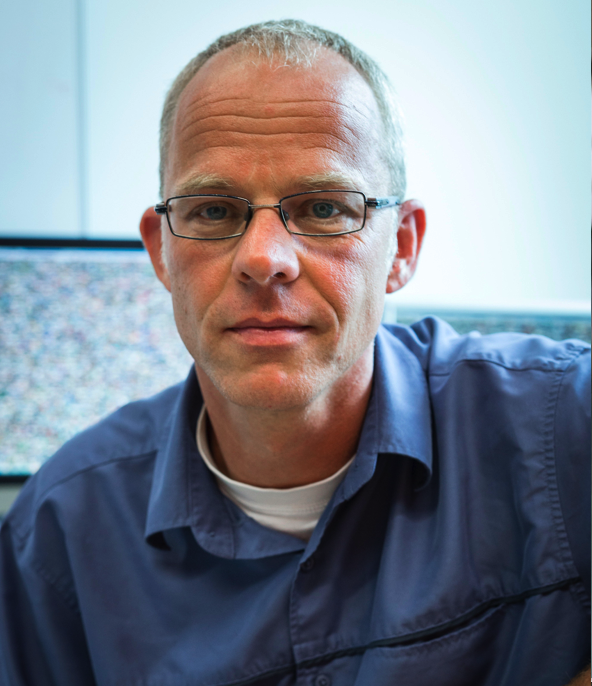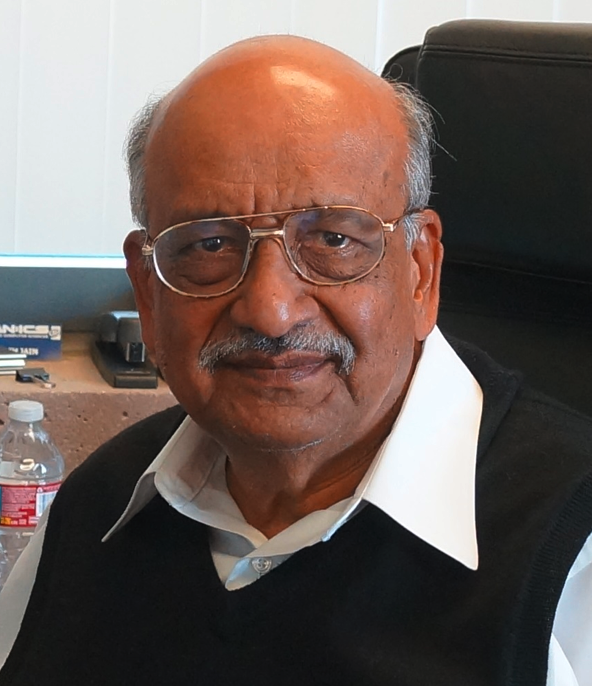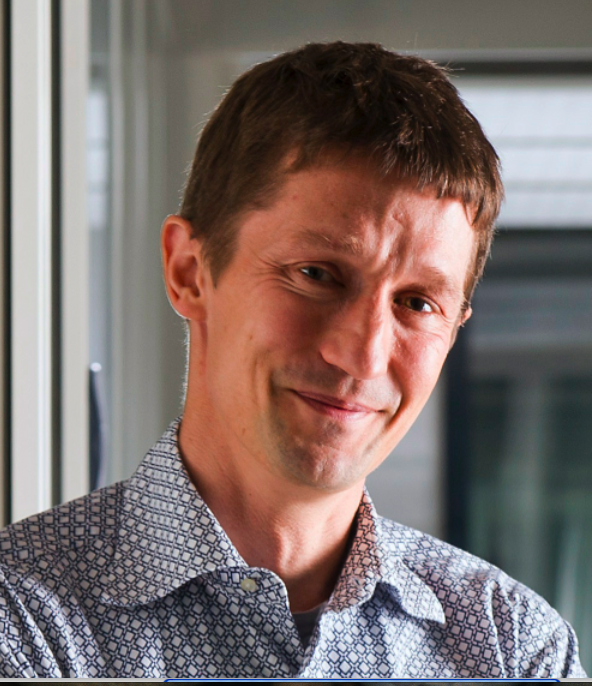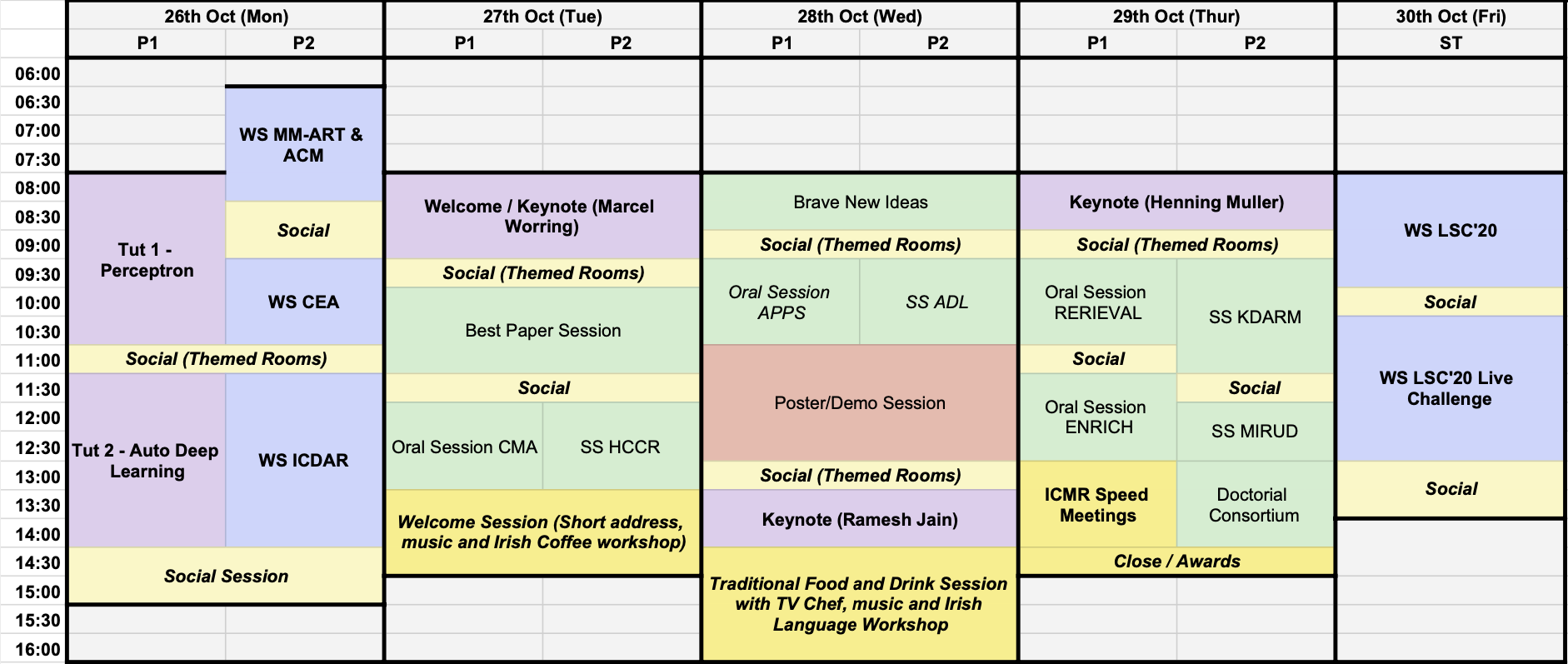Programme
The ACM ICMR’20 programme this year consists of:
- 4 workshops (including the 3rd Lifelog Search Challenge)
- 3 keynote talks from leading academics and practitioners
- 2 tutorials from academics and practitioners
- 47 full papers (across ten sessions, including four special sessions)
- 34 posters and demos
- 4 social events (including traditional Irish music, food/drink, and learning the Irish language session)
A more detailed programme can be viewed here.
Social & Cultural Events
We had some wonderful plans to give delegates a memorable experience in Dublin at ICMR'20. However, as with much else in 2020, our plans were ruined by the coronavirus pandemic. Fast evolving government restrictions in Ireland (since October 21st) have meant that our plans for even virtual social live-streams have had to be cancelled with less than a weeks notice before ICMR'20 starts. Hence, we have been pivoting numerous times and can finally confirm the following aspects of the social sessions at ICMR'20:
- Irish Music. We will have four 15 minute Irish music sessions during the two social sessions on the 27th and 28th October. Due to enhanced government restrictions in Ireland since mid-October, these will be pre-recorded for ICMR'20.
- Irish Food. We are delighted to announce that we will have a 30 minute session on Irish food on 28th October by famous TV chef Catherine Fulvio, who will teach attendees how to make "Potato and Smoked Salmon Cakes with Horseradish Cream".
- Irish Coffee Workshop - Irish coffee was originally invented to serve to passengers alighting from transatlantic flights on flying boats in the 1940s. It is a blend of coffee and Irish Whisky with cream, sugar and spices. The workshop will be hosted by Roe & Co, a leading Irish whisky distillery based in the old centre of Dublin, right beside the world-famous Guinness Brewery.
- Irish Language Workshop - Did you know that Irish language (also called Gaelic)m with a basic written form dating back to at least the 4th century CE, and written Irish in a Latinic script since the 5th century, Irish has the oldest vernacular literature in Western Europe. We will host a workshop to introduce Gaelic and teach delegates basic Gaelic for introductions and important words such as 'sláinte' which means cheers.
Venue
ICMR 2020 will be hosted by Dublin City University and the conference will take place entirely using an online platform. Details will be provided shortly.
Registration Information
Due to the covid crisis, we have had to move the ICMR'20 conference to be fully online. Consequently we have done our best to reduce the costs for all attendees. All registration options can be at either the normal rate or the reduced SIG MM member rate. If you are not already a member and wish to join SIG MM before registering, please do so here. The cost of joining SIG MM is only $20 and it reduces the cost of registraiton significantly.
The table below shows the new rates for attendance at ICMR'20 for both authors and non-author attendees. One normal author registration (at either the 'Author Virtual Regular Rate' or the 'Author Virtual Regular Rate (SIG MM)') is still required for every accepted contribution to the conference or any of the associated workshops.
Each registration rate is all-in, which facilitates attendees to attend the full conference along with all social events, the two tutorials as well as the five associated workshops.
For registration, please log into your ICMR'20 conftool account or create a new one. The registration costs are outlined in the below table.
For attendees who have paid these rates, we intend to reimburse the difference in rates AFTER the conference has taken place and all costs cleared. This repayment is likely to be via bank transfer.
| Registration Type | Author Regular Rate (until 23 Oct) | Author Late Rate | Non-Author Regular Rate (until 23 Oct) | Non-Author Late Rate (after 23 Oct) |
|---|---|---|---|---|
| Virtual Regular Rate | €300 | €400 | €70 | €120 |
| Virtual Regular Rate (SIG MM) | €250 | €350 | €25 | €75 |
| Virtual Student Rate | €150 | €250 | €45 | €95 |
| Virtual Student Rate (SIG MM) | €100 | €200 | €0 (free) | €50 |
| Virtual LSC Partner Rate | €150 | €250 | €45 | €95 |
| Virtual LSC Partner Rate (SIG MM) |
€100 | €200 | €0 (free) | €50 |
The old (pre-covid) rates are maintained here for historical purposes.
| Registration Type | Physical Conf Early Rate | Physical Conf Regular Rate |
|---|---|---|
| Regular Rate | €750 | €800 |
| Regular Rate (SIG MM) | €650 | €700 |
| Student Rate | €400 | €450 |
| Student Rate (SIG MM) | €300 | €350 |
| LSC Partner Rate | €400 | €450 |
| LSC Partner Rate (SIG MM) |
€300 | €350 |
Keynote Speakers
Marcel Worring (University of Amsterdam)

Prof. dr. Marcel Worring is a professor of computer science at the University of Amsterdam. He has a long research history in multimedia. He is co-author of the renowned “CBIR at the end of the early years paper” and 20 years later still intrigued by the challenge of truly interactive methods for multimedia retrieval and the new opportunities that deep learning brings. He has written over 200 papers in the field with a focus on multimedia analytics, combining multimedia analysis, interaction, and visualization to give people insight in large multimedia collections. He is the director of the Innovation Center for Artificial Intelligence – Amsterdam, a center where universities work together with industry and governmental organizations in joint research labs with a span of five years and at least five PhD students. He is co-directing two such labs, one on techniques to support law enforcement and one on medical imaging and in addition has research projects on art and city analytics. He has been associate editor of ACM Transactions on Multimedia, IEEE Transactions on Multimedia and currently is associate editor of IEEE Multimedia. He was co-chair of ACM Multimedia 2016, is program coordinator of ACM Multimedia 2020, and program chair of ACM ICMR 2021.
Beyond relevance feedback for searching and exploring large multimedia collections
Time: Tuesday, 27th October, 08:30-09:30
Relevance feedback was introduced over twenty years ago as a powerful tool for interactive multimedia retrieval and still is the dominant mode of interaction. Over the years methods have improved and recently relevance feedback has become feasible on even the largest collections available in the multimedia community. Yet it focuses on only one of the many tasks on the search – explore axis. Truly interactive retrieval systems have to consider the whole axis and interactive categorization is an overaching framework for many of those tasks. Categorization, however, does not capture the relations between items in the collection. Hypergraphs are combining categories and relations in one model and therefore provide an elegant framework to move forward. In this talk we highlight the progress that has been made in the field of interactive retrieval and the promises that new results in deep learning and hypergraphs might bring.
Ramesh Jain (University of California, Irvine)

Ramesh Jain is an entrepreneur, researcher, and educator. He is a Donald Bren Professor in Information & Computer Sciences at University of California, Irvine. His research interests covered Control Systems, Computer Vision, Artificial Intelligence, and Multimedia Computing. His current research passion is in addressing health issues using cybernetic principles building on the progress in sensors, mobile, processing, artificial intelligence, computer vision, and storage technologies. He is founding director of the Institute for Future Health at UCI. He is a Fellow of AAAS, ACM, IEEE, AAAI, IAPR, and SPIE. Ramesh co-founded several companies, managed them in initial stages, and then turned them over to professional management. He enjoys new challenges and likes to use technology to solve them. He is participating in addressing the biggest challenge for us all: how to live long in good health.
What Should I do?
Time: Wednesday, 28th October 13:30-14:30
I find myself asking, “What should I do?” in many situations such as when I want to go out to eat; I want to decide about my vacation; decide on spending some free time on the weekend; and numerous other decisions. All these decisions are really personalized contextual decisions that may be addressed by a contextual recommendation engine that knows me. For knowing me well, the engine should prepare my model based on all events in my life. By retrieving and mining events of various types computed using different multimodal data streams, such a personal model may be prepared and then used to help in making decisions ranging from trivial to critical. We discuss important challenges in organizing life events that may be used for building personal models and for accessing characteristics of such events as may be needed in various applications. We will demonstrate our ideas using some applications related to lifestyle and health.
Henning Müller (University Hospitals of Geneva)

Henning Müller studied medical informatics at the University of Heidelberg, Germany, then worked at Daimler-Benz research in Portland, OR, USA. From 1998-2002 he worked on his PhD degree in computer vision at the University of Geneva, Switzerland with a research stay at Monash University, Melbourne, Australia. Since 2002, Henning has been working for the medical informatics service at the University Hospital of Geneva. Since 2007, he has been a full professor at the HES-SO Valais and since 2011 he is responsible for the eHealth unit of the school. Since 2014, he is also professor at the medical faculty of the University of Geneva. In 2015/2016 he was on sabbatical at the Martinos Center, part of Harvard Medical School in Boston, MA, USA to focus on research activities. Henning is coordinator of the ExaMode EU project, was coordinator of the Khresmoi EU project, scientific coordinator of the VISCERAL EU project and is initiator of the ImageCLEF benchmark that has run medical tasks every year since 2004. He has authored over 500 scientific papers with more than 14,000 citations and is in the editorial board of several journals.
Medical image retrieval: applications and resources
Time: Thursday, 29th October 2020, 08:00-09:00
Content-based medical image retrieval started in the mid 1990s and quickly became an important research topic thanks to the large amounts of medical data available and the limited use that was made of these data despite the value contained in them. Still, clinical impact has been limited so far, and few user studies exist that show a lasting influence. Much of the AI-based decision support on medical imaging has rather be related to classification and detection tasks and several of these classification/detection tools are now FDA/CE approved and thus can be used in clinical routine. Digital medicine will require tools that include an effective management of medical image data and particularly a combination of visual data with free text and structured data can help to exploit all medical content for both clinical work and also teaching. The presentation will give a historical perspective to medical image retrieval and will explain available resources and several ideas for future research and also ways of integrating research tools into the clinical workflow.
Visa Support
Everyone entering Ireland must have a valid passport, or in the case of European Union Member States, a national identity card. Visas are required for some countries. Delegates should check with their local Irish representation. A valid driving license is required to drive in Ireland.
Please note that it can take many weeks to process a visa application and early application is highly recommended. The Conference Organising Committee, or its agents, cannot accept any responsibility for visa applications.
If you need to apply for a visa, please register for the conference, pay your registration fees in full and request a visa letter from the ICMR’20 organisation team by emailing office@icmr2020.org.
Please note the Irish Embassy will only accept a visa letter if it states that the delegate has registered for the conference and has paid their registration fees in full. The Irish Embassy will only accept original letters from us so please allow enough time for us to post the visa letter to you.
For more information please see the Department of Foreign Affairs webpage www.dfa.ie
Travel Grants
Starting this year, SIGMM is centralising SIGMM support for standard student travel. Any student member of SIGMM is eligible to apply, however, the students who are the first author of an accepted paper (in any track/workshop) are particularly encouraged to apply. The value of the grant depends on the travel distance as listed below:
$2000 for long-haul (Americas and Asia/Pacific)
$1000 for short-haul (Europe and Middle East)
Note that the grants can cover any travel expenses (airfare/shuttle, hotel, meals) but cannot be used to cover the registration fee. Please review these details on the ACM’s reimbursement process.
Applicants must be a member of SIGMM (if not already, become a member here) and enrolled in a university at the time of the submission.
Application Procedure
The application must be submitted online between March 8th and June 30th. Applications will be reviewed early after that and applicants will be notified in due time
Each accepted paper at ICMR’20 and the co-located workshops must be covered by a unique author registration to be included in the proceedings. A travel grant does not waive this requirement. Also note that the recipients of the following grants may be asked to assist the local organisers in the preparation, logistics and various supporting tasks of the conference.
Local Information
About Dublin
Dublin is one of the top city break destinations in Europe and for atmosphere, nightlife, visitor attractions, activities and shopping, Dublin has very few rivals. Steeped in history and buzzing with youthful energy, the Irish capital is at the very heart of Irish culture and industry.
Climate
Dublin's climate is mild and very changeable. It is influenced by the Gulf Stream. Winter temperatures average 4°C-7°C (39°-44°F) and in summer between 16°C-20°C (60°F-67°F). There are about eighteen hours of daylight daily during July and August, only getting truly dark after 23.00. In June, one can expect an average temperature of about 18°C, with a 1/3 chance of rain on each day, so we include one disposable raincoat in your delegate pack.
Population
The population of Dublin City and County is almost 1.4 million. English is the spoken language throughout Ireland. Irish (or Gaelic) is the original native language of Ireland. Place names and signage are usually in both languages.
Tourism
Dublin Tourism Information and Reservation Centres can be found at Dublin Airport, Dún Laoghaire Ferry Port, Suffolk Street and O'Connell Street. Call into one of their offices and let the experts guide you around Dublin.
Some Information about Ireland
COVID-19
Updated 06 April 2020. Due to the ongoing disruption caused by the Covid-19 pandemic, the organisers of ICMR 2020, after consultation with the ICMR Steering Committee and SIGMM officers, have decided to postpone the ICMR'20 conference until the 26-29th October 2020. We have taken this decision with the health of delegates and organisers as our top priority, and to provide the best possible chance to facilitate delegate attendance. We are also planning to provide remote participation facilities where necessary. Please note that the scientific activities of the conference are proceeding as planned, so authors should follow the instructions and deadlines from Sheridan Publishing/ACM for the submission of their final paper versions. In particular, it is our intention that the conference proceedings will be published according to the planned schedule.
Sustainability
ICMR’20 has been organise so as to reduce the environmental impact of the conference. All venues are in the city centre and within walking distance from each other and ICMR’20 will aim to be paper-free as much as feasible. ICMR’20 will also be putting in place a CO2 estimation for the conference (local and travel components). We will display a CO2 estimate prominently at the conference and we will provide very attendee who wishes, an estimate of their CO2 emissions from travel and local activities. Additionally, we will offset the CO2 emissions from the conference local activities by targeted local activities.
Call for Participation
ACM ICMR’20 will provide a great opportunity for exchanging leading-edge multimedia retrieval ideas among researchers, practitioners and users of multimedia retrieval systems. Virtual registration rates are now open and range from €0 (free) for student SIG MM Members to €70 for regular attendees. Please register before 21st October to avail of these rates.
ACM ICMR’20 has been designed by the organisers to encourage a very social online conference experience and will be hosted using the On-Air virtual event platform which facilitates high-quality streamed talks, live social sessions, poster & demo sessions, delegate profiles, real-time chat and calls with delegates/speakers and numerous opportunities to meet and greet other delegates during the event and the eleven dedicated social events.
Highlights of the ACM ICMR’20 Conference
Workshops
MM ART & ACM 2020 - International Joint Workshop on Multimedia Artworks Analysis and Attractiveness Computing in Multimedia (http://www.attractiveness-computing.org/mmart_acm2020/)
CEA 2020 - 12th Workshop on Multimedia for Cooking and Eating Activities (https://sigcea.org/workshop/2020/)
ICDAR 2020 - Intelligent Cross-Data Analysis and Retrieval Workshop (http://www2.nict.go.jp/bidal/icdar_icmr2020/index.html)
LSC 2020 - 3rd Annual Lifelog Search Challenge (http://lsc.dcu.ie/)
Keynote Talks
- Beyond relevance feedback for searching and exploring large multimedia collections (Marcel Worring - University of Amsterdam)
- What Should I do? - Ramesh Jain (University of California, Irvine)
- Medical image retrieval: applications and resources (Henning Müller - University Hospitals of Geneva)
Tutorials
- One Perceptron to Rule Them All: Language, Vision, Audio and Speech (Xavier Giro, Universitat Politecnica de Catalunya, Spain)
- Automation of Deep Learning - Theory and Practice (Martin Wistuba, Ambrish Rawat, Tejaswini Pedapati, IBM, Ireland)
Social Sessions
- Two live Irish music streams on the 27th and 28th October
- Introduction to Irish Food Session (from ingredients to enjoyment)
- Introduction to the Irish Language (speaking your first words of Gaeilge)
- Lesson on Irish Coffee making (Roe & Co - Guinness Brewery)
- And many other opportunities to meet and greet delegates, including a random introduction session.
